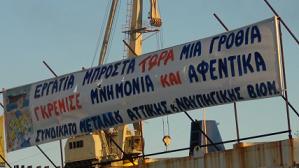Last week, the Union of Metalworkers of Athens and Shipbuilding Industry of Greece achieved the signing of a Collective Contract for the Shipbuilding Industry, after almost 9 months of multiform struggle.
The Collective Contract that was signed between the union and the employers’ association, after this important struggle, is a major step for the workers towards regaining their losses, in the fight against the employers’ plans, who intend to maintain and expand the negative working conditions. It is a major step in the struggle to regain rights and wages that were targeted the previous years by the employers. The Collective Contract gives important raises in the daily wage for the majority of the workers. As regards the work hours it is agreed that it will be 7 hours of work per day, 5 days of work per week with two breaks in a 7-hour workday.
The Conditions And The Employers’ Tactics Against The Collective Contract
The signing of the contract came in spite of the numerous methods used by the employers to attack PAME and the Union of Metalworkers of Athens and Shipbuilding Industry of Greece.
The employers used slander; they used their media that the workers’ must accept lower salaries to have jobs, etc. And that was said to a Sector, where already unemployment had reached 90%.
When such tactics failed, they used trade unionists of SYRIZA to break the unity of the workers and form a separate union. At the same time, the Panhellenic Metalworkers Federation (POEM), affiliate of Industriall, called the workers to abandon demands for raises in their salaries, and support the competitiveness of the industrialists.
When all these failed, the employers financed the fascists of Golden Dawn, who founded a Union only for Greeks, which was basically an outsourcing company, under the label of the Union. At the same time the fascists tried to intimidate the workers by declaring that they will “destroy PAME”. Following this statement they organized a murderous attack against the leaders of the Metalworkers Union.
In spite of their intimidation tactics, the steadfast struggle of the class unions of PAME and the unity of the workers against the employers’ plans lead all their attempts to failure.
How The Signing Of The Agreement Was Achieved
The signing of the Collective Contract came as a result of the workers’ struggle since the beginning of 2017, which rallied the vast majority of the workers in the Shipbuilding Sector. Strikes, work stoppages, workers’ meetings in the workplaces and general meetings of the sector, with the participation of Unions of Metalworkers from other countries, such as Turkey, joint actions with Peoples’ Committees and other unions in the neighborhoods where metalworkers live, like Perama and Piraeus, as well as protests, occupations and other actions at the Greek Ministry of Labour and other State organizations. Those are some of the forms of struggle the workers used.
During those months, certain steps were made in the workers’ struggle that led to the signing of the Agreement. For example, more than 80 bilateral Agreements were signed between the Union and individual employers, which was a result of the constant action of the workers and their Union, who managed to raise the daily wage and improve the working conditions. Almost all of the companies were forced to accept the 7-hour workday, after many strikes, work stoppages and organized actions.
Details about the Contract and Its Regulations
Regarding overtimes, the Agreement states that 100% raise from the first hour of overtime, while setting a limit of 3 overtime hours. The Agreement also contains rules regarding health and safety regulations and the right of a worker to compensation in case of a work related accident, from the first daily wage. Moreover, the Agreement stipulates the payment of additional salaries for Christmas and Vacation time (that is the so called 13th and 14th salary). The Agreement will apply nationally and will be in force until the end of 2018, with post-termination rights for three years after its termination.
The Agreement draft had been presented, discussed and approved in a General Meeting of the workers in the Shipbuilding Sector, called by the Union.
After the signing of the Agreement, the Union already continues to organise the next step of the struggle, the fight to impose what the Agreement states. The workers will find the employers against them, even though they were forces to sign the Agreement under the pressure of the strikes and multiform actions. The employers will continue their attempts to undermine the Contract, as also do the antiworkers’ laws imposed by the Greek Government. Laws that aim to abolish the Collective Contracts and bargaining, which have made the application of Collective Contracts non-obligatory.
The signing of the Collective Contract with better wages and conditions is an important success of the class trade union movement. Even in these negative conditions, workers, organized, militantly and steadfast can succeed to change the correlation and achieve restoration of their rights.
The success of the metalworkers is a positive base for the trade union movement to push forward the fight for the reestablishment of Collective Contracts with better wages and conditions


